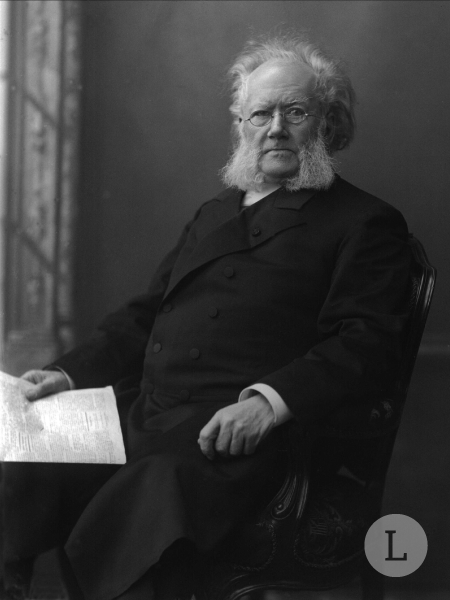
born: MARCH 20, 1828
died: MAY 23, 1906
nationality: NORWEGIAN
movement: REALISM
Discover the life and works of Henrik Ibsen, one of the most influential playwrights of the 19th century, often referred to as the “father of modern drama.” This comprehensive biography covers Ibsen’s early life, education, career, top books, interesting facts, and the enduring influence of his works on theatre and popular culture. Journey through the world of this groundbreaking playwright, whose innovative and thought-provoking plays continue to captivate audiences and inspire new generations of artists.
EARLY LIFE AND EDUCATION
Henrik Johan Ibsen was born on March 20, 1828, in Skien, a small port town in Norway. He was the eldest of five children in a well-to-do merchant family. However, his father’s financial troubles led to a decline in the family’s social status and economic stability. This experience had a profound impact on Ibsen and would later inform his writing.
Ibsen attended local schools until the age of 15, after which he was apprenticed to a pharmacist. It was during this time that he began writing plays, exploring themes of social criticism and individual responsibility that would come to define his work.
CAREER AND LITERARY SUCCESS
Ibsen’s literary career began with the publication of his first play, Catiline (1850), which was influenced by his admiration for the Roman Republic. However, it was not until the 1860s that Ibsen gained recognition as a playwright with works such as The Pretenders (1863) and Brand (1866), which examined the role of the individual in society.
Ibsen’s international breakthrough came with A Doll’s House (1879), a controversial play that questioned the traditional roles of men and women in marriage and society. This play, along with others like Ghosts (1881) and An Enemy of the People (1882), solidified Ibsen’s reputation as a trailblazer in modern drama.
Ibsen continued to write plays that explored social and psychological issues, often pushing the boundaries of what was considered acceptable in his time. His later works, such as Hedda Gabler (1890) and The Master Builder (1892), remain some of the most influential and enduring plays in modern theatre.
TOP 10 BOOKS BY HENRIK IBSEN
A Doll’s House (1879)
A groundbreaking play that challenged societal norms, focusing on a woman’s struggle for independence and self-fulfillment within the confines of marriage.
Ghosts (1881)
A provocative play that deals with issues of morality, family, and the haunting effects of the past.
An Enemy of the People (1882)
A powerful exploration of the conflict between individual conscience and societal expectations, as a doctor discovers a potential public health crisis.
Hedda Gabler (1890)
A psychological drama that centers on a strong-willed woman’s battle against societal constraints and her own destructive nature.
The Master Builder (1892)
A complex exploration of ambition, obsession, and the human spirit, as an architect faces both his inner demons and the consequences of his past actions.
Peer Gynt (1867)
A poetic drama that blends folklore, fantasy, and satire in the story of a young man’s search for identity and meaning in a world full of contradictions.
Rosmersholm (1886)
A deeply introspective play that examines the struggle between tradition and progress, as well as the personal and political conflicts that arise from these opposing forces.
The Wild Duck (1884)
A tragicomedy that explores the consequences of idealism and self-deception, as a family’s carefully constructed world begins to unravel.
The Pillars of Society (1877)
A scathing critique of middle-class hypocrisy and corruption, this play explores the lengths to which people will go to protect their public image.
The Lady from the Sea (1888)
A symbolic and psychological drama that delves into themes of love, freedom, and the power of the past over the present.
INTERESTING FACTS
- Ibsen was a prolific writer, completing a total of 26 plays during his lifetime.
- He is often referred to as the father of modern drama due to his influence on later playwrights such as George Bernard Shaw, Arthur Miller, and Eugene O’Neill.
- Ibsen’s plays were considered scandalous in their time, as they tackled controversial topics and questioned societal norms.
- In 1858, Ibsen married Suzannah Thoresen, who is said to have been the inspiration for several of his strong female characters.
- Ibsen was a highly private individual and rarely gave interviews or discussed his personal life.
AWARDS AND HONORS
While Ibsen did not receive many awards during his lifetime, his work has been celebrated and recognized for its lasting impact on literature and theatre. Some posthumous honors include:
- In 2006, the centenary of Ibsen’s death was marked by numerous international events, including the Ibsen Year celebrations in Norway.
- The Ibsen Museum in Oslo, established in 1990, is dedicated to preserving and promoting Ibsen’s life and work through exhibitions, research, and educational programs.
- The International Ibsen Award, established in 2007, honors individuals or institutions that have made a significant contribution to the development of theatre and drama in the spirit of Henrik Ibsen.
Henrik Ibsen’s lasting impact on theatre and literature is undeniable, and his innovative, challenging works continue to be studied, admired, and celebrated for their unparalleled contributions to the world of drama.
DEATH AND LEGACY
Henrik Ibsen passed away on May 23, 1906, in Christiania (now Oslo), Norway, at the age of 78. His legacy as one of the greatest playwrights of the 19th century endures, with his works continuing to be performed and studied worldwide.
Ibsen’s plays have had a lasting impact on modern drama, with their innovative exploration of social, political, and psychological issues. His groundbreaking use of realistic dialogue, complex characters, and thought-provoking themes have influenced countless playwrights and helped to shape the course of modern theatre.
